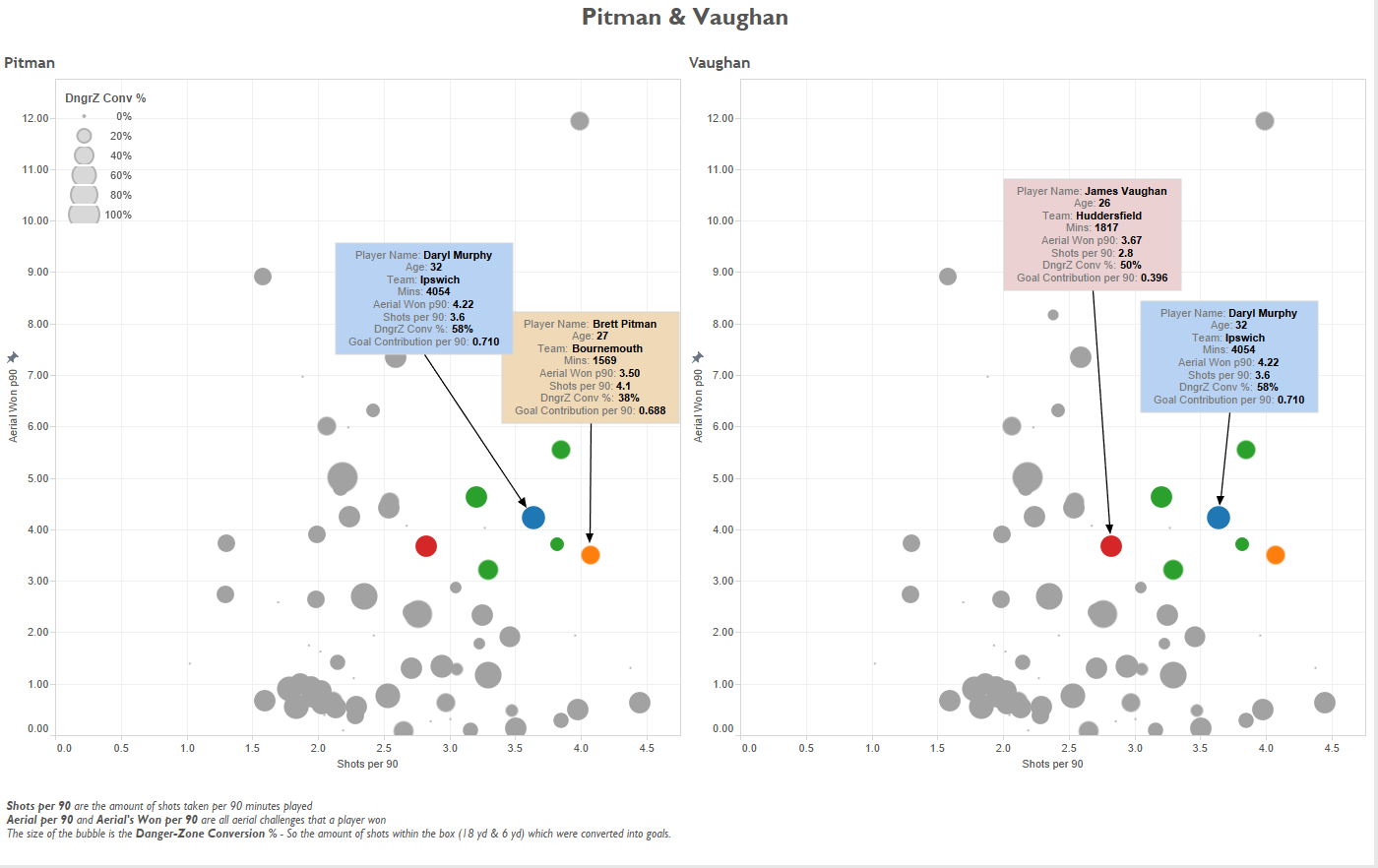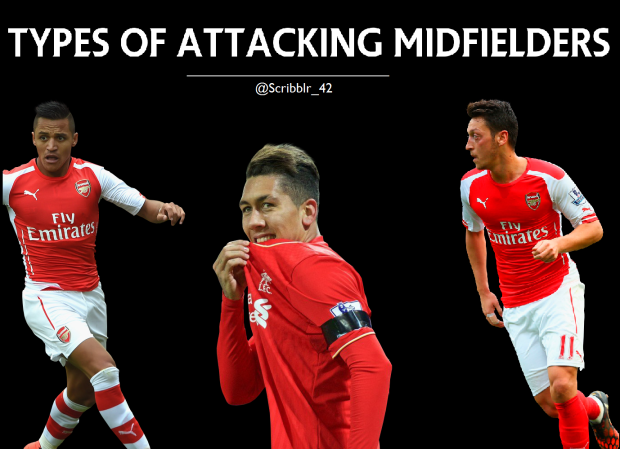
Disclaimer; this post isn't about Ozil. Much.
Mesut Ozil is killing it this season.
With over 15 assists already, the German international is on course to hit and surpass Thierry Henry's record of 20 assists in a Premier League season (anyone else unsurprised that this is another Arsenal player under Wenger who holds this accolade?) - But what shouldn't be forgotten is the stick that Arsenal's record signing got in the first season and a half he spent in North London. As the narrative goes, Mesut was not a big game player nor was he the type to be prolific in front of goal.
This tweet by Simon Brundish got me thinking; how long should different types of players be given to make an 'impact'?
 Let's examine another player alongside Ozil; Alexis Sanchez. Arguably, he also counts as an attacking-midfielder and I'm sure it cannot be argued that his debut Premier League season was better than Ozil's.
Let's examine another player alongside Ozil; Alexis Sanchez. Arguably, he also counts as an attacking-midfielder and I'm sure it cannot be argued that his debut Premier League season was better than Ozil's.Where Ozil played 2150 minutes in the Premier League, scored 5 goals and registered 9 assists (a scoring contribution of 0.586 per 90) in his first season, Sanchez played 2953 minutes, scoring 16 goals and 8 assists (a scoring contribution of 0.732 per 90)
So Alexis had a higher impact; but ultimately, they are two very different attacking midfielders. Where Ozil is a 'creator' and a orchastrator, Alexis is perhaps more direct. Let's see if this hypothesis holds.
Alexis took 3.5 shots per game, made 2.3 key passes and attempted 3.3 dribbles per game. Conversely, Mesut's first season yielded 1.2 shots per game, 2.9 key passes and 1.7 dribbles.
Already we can see Ozil's emphasis on creating chances than attacking a full back, and perhaps this is why he tended to play narrow for Arsenal even when placed on the wing.
But the secondary factor is this; where Alexis' game relies upon getting the ball, attacking individually, receiving and letting shots fly, Ozil needs to have the movement, space and time to pick out the passes he wants to make. And this would require the players around him to also understand his game.
The purpose of this post is Liverpool's #11, Roberto Firmino. As a rule of thumb (which stems from probably a comfort with multiples of 5), pundits refer to a great midfield player as someone who posts 10 goals and 10 assists a season.
In Ozil's three seasons with Real, he averaged about 6 goals and 15 assists per season.
Alexis at Barca in his three La Liga seasons averaged 13 goals and 8 assists per season.
So where does this leave Bobby Firmino? In his last 3 seasons at Hoffenheim, he averaged 9 goals and 8 assists a season - so perhaps a bit more balanced than the examples examined above. Last season, he took 2.9 shots per game, made 2.1 key passes and 4.2 dribbles - which actually points him to be closer to Sanchez than Ozil in this comparison - his scoring contribution was (in 2918 minutes played) 0.524, with 7 goals and 10 assists. These came in 33 starts, and was slightly down from his previous season. Another factor to his slow start at Anfield could be starting every game two seasons back to back, and representing Brazil at the Copa America this summer.But I am no sports scientist and cannot speculate on this in an informed manner.

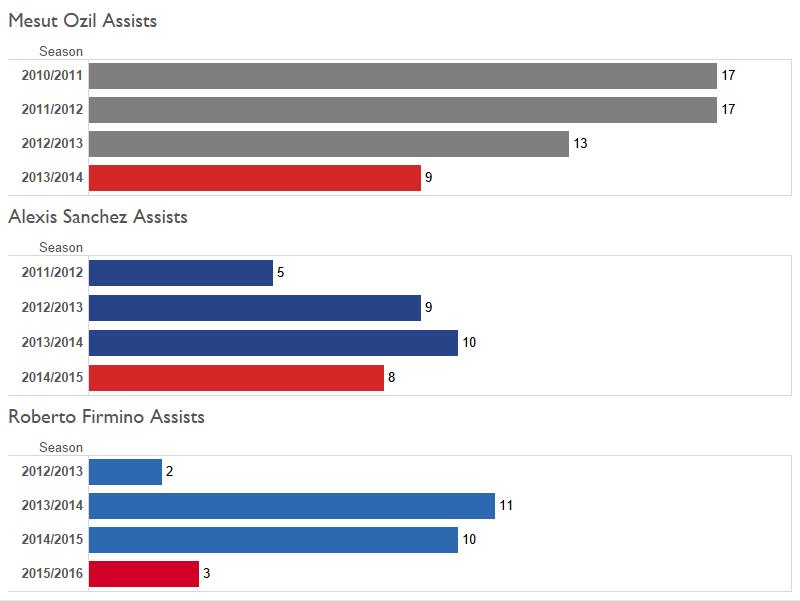
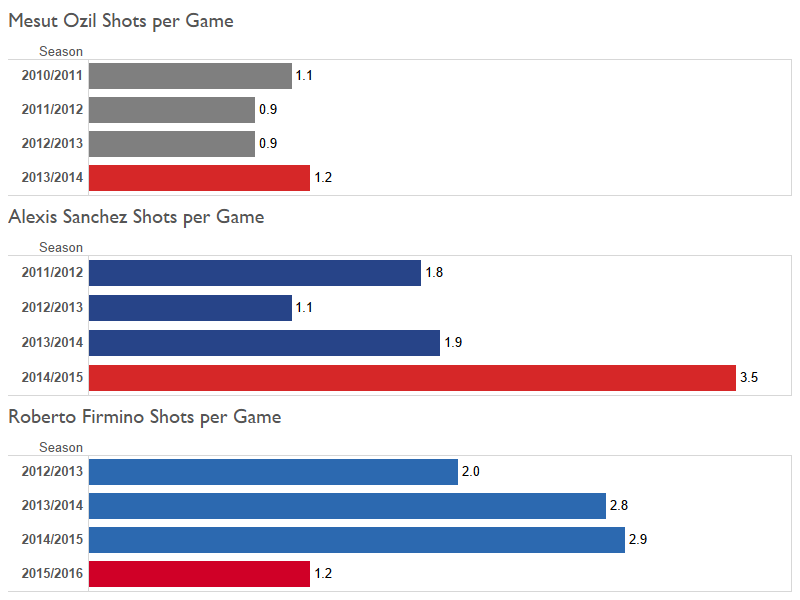
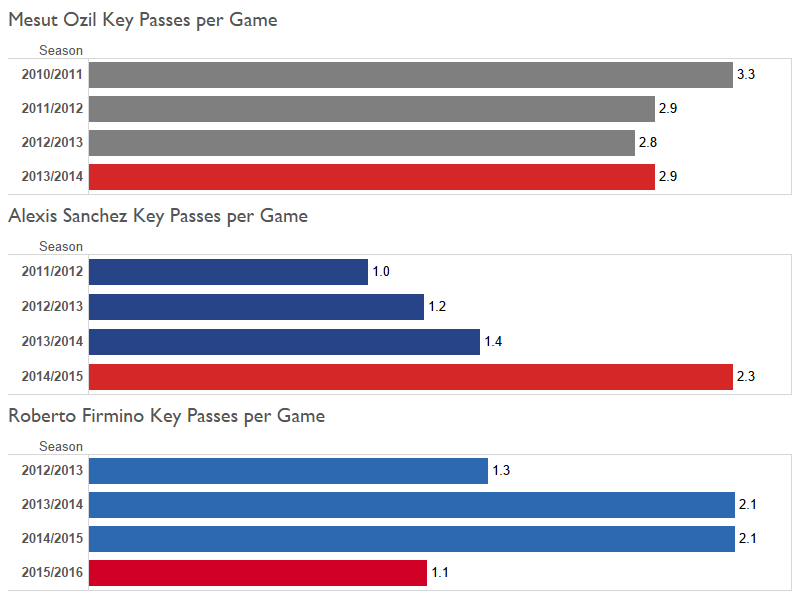
 Using just one example of comparing Ozil and Alexis (given their 3 season stints in Spain prior to joining Arsenal), this could be a reason why Firmino is taking time to bed into Liverpool.
Using just one example of comparing Ozil and Alexis (given their 3 season stints in Spain prior to joining Arsenal), this could be a reason why Firmino is taking time to bed into Liverpool.From my understanding, attacking midfielders can be 'a Sanchez'; a direct runner, who takes a lot of shots, is good with the ball at their feet. Or, they could be more of 'an Ozil'; less shots, more creativity, with an emphasis on assisting than scoring. The latter I feel requires a few things.
- Understanding the role; making sure that the role and all the tasks a player has to complete on the pitch are understood and being met - and that they are comfortable doing so
- Cohesion with teammates; for Ozil, players need to trust that if they make the run, Ozil can find them, and similarly that if they are to utilise his creativity, the man needs space. This positional understanding, trust & chemistry are important to ensure moves look as fluid as they can.
- Acclimatising mentally & physically; this includes on and off the pitch. On the pitch, the pace, space and movement need to be adapted for the environment an attacking midfielder finds themselves, and off the pitch, the club should ensure that the player is in the right state of mind to perform and 'hit the ground running'
In this vein, I feel that though Firmino may not have sparkled, his passing networks and interplay with his team-mates will increase similar to Ozil's has, and he possesses the ability to run at full-backs and contribute in a way that Sanchez can. It'll be interesting to see how Klopp utilises and changes the use of the Brazilian midfielder.











